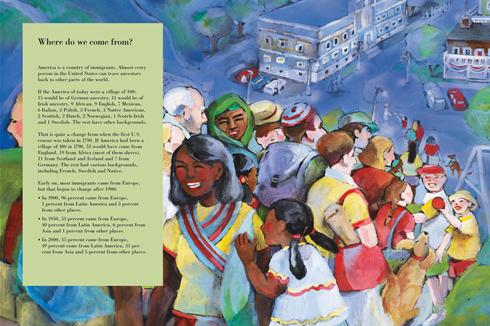Dr. Phillip Harter of Stanford University has found that if we could shrink the earth's population to a village of precisely 100 people, with all the existing human ratios remaining the same, there would be:
Dr. Harter concludes: "When one considers our world from such a compressed perspective, the need for both acceptance, understanding and education becomes glaringly apparent." Let's read that sentence again: "When one considers our world from such a compressed perspective, the need for both acceptance, understanding and education becomes glaringly apparent." For you see my friends, as of October 31, 2001 we share this planet with seven billion other people! What do we know about them? Sociology is the systematic study of people in groups. Notice there are several elements in that definition. We study people in groups "systematically" and not casually. 1. Please take a good look at the set of facts above. Write several sentences describing the "typical" person with whom you share this world. Put another way, for most people in this world, what is there life like? (Note: I am NOT asking about the typical person you share YOUR world with. I am asking you a much more global question and trying to get you to think bigger. For example, looking at the facts above the typical person you and I share this world with happens to be a woman who does not own a computer - what other conclusions can be drawn?) If you like - here is the latest information which is not meant to confuse and may help. 2. In several sentences describe an "atypical" (opposite of typical) individual - what characteristics do they possess? 3. Now, in a global sense and given the facts above, are you a typical individual? Why or why not? (And, if you begin with "Yes, I am typical because I have a cell phone and love video games," you need to look again!) Looking at just the United States will reveal a different picture. Click here to access the U.S. Census Bureau to answer the following questions. (Look for "population clock" upper right side) (Do not print this site! It's huge!) 4. How many people live in the world? What is the population of the United States?
5. According to this article is the population of the U.S. distributed evenly geographically? Why or why not? 6. Is wealth (money and income) distributed evenly? Why or why not? 7. What conclusions can you draw about the ethnic make up of the U.S.? 8. What conclusions can you draw about U.S. religious practices? 9. What question do you have about U.S. demographics after reading this article? Until now you have been making observations about social facts. But sociologists do more: They gather social facts to reach a conclusion which thus proves or disproves their initial hypothesis. Let's say I formulated the hypothesis that women tended to smoke more than men. Simple enough. First I would need to decide how many people to include in my study. This is called sampling and the group chosen becomes my sample. Let's say I decided to ask 100 people. What social facts would I need to collect? Just two: their gender (male or female) and whether or not they smoked. (Someone who reported that they smoked "sometimes" would need to decide if they were or were not a smoker - "sometimes" would not work for purposes of my simple study.) After interviewing 100 people and determining their gender and smoking status, I would know whether or not my hypothesis was true, i.e., did women tend to smoke more than men. When interpreting data a good sociologist would also consider other factors that may have influenced or limited the study. Things like where and when the study was conducted, etc. Now it's your turn! This is your chance to try out your skills as a sociologist. 10. First what hypothesis are you going to investigate? (It can be almost anything - keep it simple!) 11. What social facts will you have to gather (what questions will you have to ask) from the members of your sample which will prove or disprove your hypothesis? 12. How many individuals will you gather social facts from? In other words, what do you think is a good number for your sample? 13. Conduct your experiment/study and let me know the results! 14. What's your conclusion? Did you initial hypothesis prove true? Why or why not? Were there other factors which might have influenced your study? 15. How did you like our first lesson? |

 Now
Now